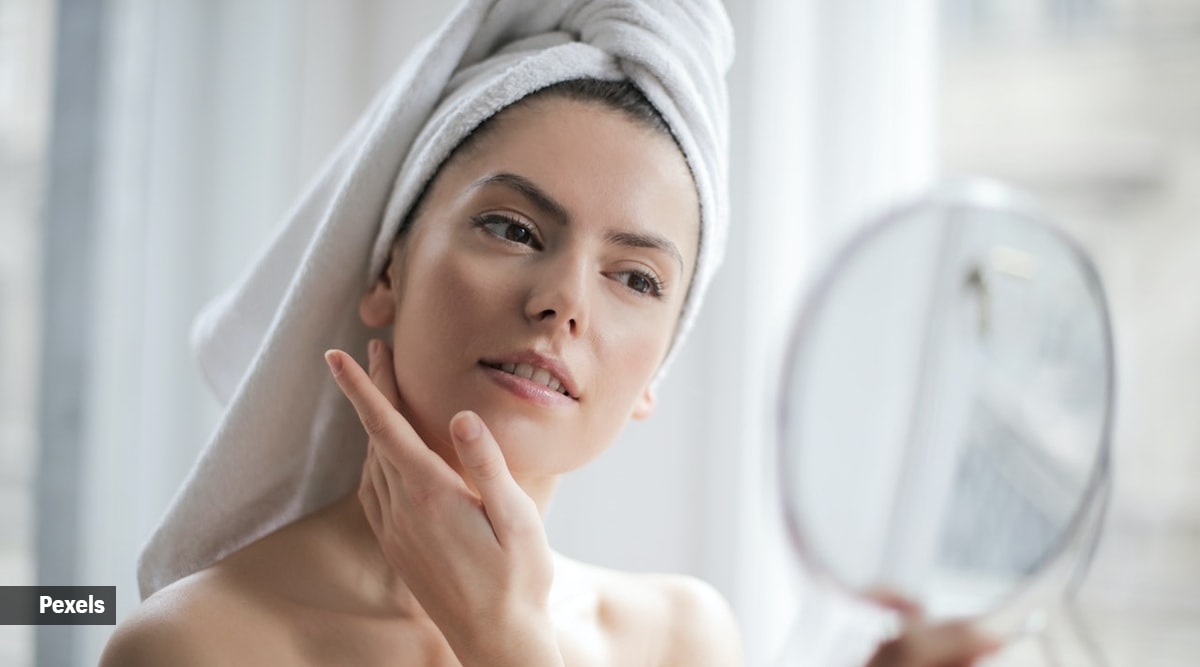Is Makeup Harmful To Your Skin? A Dermatologist's Perspective

Table of Contents
The Potential Benefits of Makeup (Used Responsibly)
While concerns about harmful makeup are valid, it's important to acknowledge the potential upsides of using cosmetics responsibly.
Concealing Imperfections and Boosting Confidence
Makeup can be a powerful tool for enhancing self-esteem.
- Improved Appearance: It can effectively conceal blemishes, redness, dark circles, and uneven skin tone, leading to a more polished and even complexion.
- Confidence Boost: This improved appearance can significantly boost self-confidence and improve mental well-being. Feeling good about your appearance can positively impact your overall mood and social interactions.
- Camouflaging Skin Conditions: For those with skin conditions like rosacea or vitiligo, makeup can help even out skin tone and reduce visible imperfections, improving self-image and reducing feelings of self-consciousness.
Sun Protection with SPF Makeup
Many foundations and tinted moisturizers now incorporate SPF (sun protection factor).
- Added Protection: This provides an additional layer of sun protection beyond your daily sunscreen.
- Preventing Sun Damage: Sun damage is a major contributor to premature aging, wrinkles, and skin cancer. SPF makeup helps mitigate these risks.
- Broad Spectrum is Key: Look for makeup with broad-spectrum SPF 30 or higher for optimal protection against both UVA and UVB rays. Remember that makeup with SPF shouldn't replace your regular sunscreen application.
Creative Expression and Self-Care
Beyond the practical benefits, makeup can also be a source of enjoyment and self-expression.
- Creative Outlet: Makeup allows for creativity and self-expression through various styles, colors, and techniques.
- Relaxing Ritual: Applying makeup can be a relaxing and enjoyable part of a daily or weekly self-care routine.
- Boosting Mood: The act of applying makeup can be a mindful and positive experience, contributing to overall well-being.
Potential Negative Impacts of Makeup on Skin Health
Despite the benefits, certain aspects of makeup use can negatively impact skin health.
Clogged Pores and Acne Breakouts
Many makeup products contain ingredients that can contribute to clogged pores and acne breakouts.
- Comedogenicity: Comedogenic ingredients are those that are likely to clog pores. Look for products labeled "non-comedogenic."
- Importance of Cleansing: Thorough cleansing is crucial to remove all traces of makeup at the end of the day to prevent pore blockage. Use a gentle cleanser suitable for your skin type.
- Oil-Based Products: Oil-based makeup can be particularly comedogenic, so consider using water-based or gel formulations.
Allergic Reactions and Irritations
Certain makeup ingredients can trigger allergic reactions or skin irritations.
- Common Irritants: Fragrances, preservatives (like parabens), and certain dyes are common culprits.
- Patch Testing: Always patch test new products on a small area of skin before applying them to your entire face.
- Sensitive Skin Considerations: Individuals with sensitive skin should opt for hypoallergenic and fragrance-free makeup.
Irritation from Harsh Chemicals
Some makeup contains harsh chemicals that can irritate the skin, especially sensitive skin.
- Harmful Ingredients: Parabens, sulfates (like SLS and SLES), and phthalates are examples of potentially irritating ingredients.
- Ingredient Awareness: Read product labels carefully and research potential irritants before purchasing.
- Natural Alternatives: Consider switching to natural or organic makeup options that often contain fewer harsh chemicals.
Choosing Safe and Healthy Makeup Products
Making informed choices about your makeup is key to maintaining healthy skin.
Reading Product Labels Carefully
Pay close attention to ingredient lists and understand potential allergens or irritants.
- Ingredient Research: Use online resources to research ingredients and their potential effects on skin.
- EWG Verification: Look for certifications from reputable organizations like the Environmental Working Group (EWG).
- Transparency: Choose brands that are transparent about their ingredients and manufacturing processes.
Opting for Natural and Organic Makeup
Natural and organic makeup often contains fewer harsh chemicals and preservatives.
- Reduced Chemicals: These products prioritize natural and plant-derived ingredients.
- Sustainable Practices: Look for brands committed to sustainable and ethical practices.
- Potential for Higher Cost: Keep in mind that natural and organic makeup can sometimes be more expensive.
Importance of Proper Makeup Application and Removal
Proper application and removal techniques are vital for preventing skin problems.
- Clean Tools: Use clean brushes, sponges, and applicators to avoid bacterial contamination.
- Thorough Cleansing: Cleanse your face thoroughly before and after applying makeup.
- Gentle Removal: Use a gentle makeup remover to avoid harsh scrubbing.
Conclusion
Makeup doesn't have to be inherently harmful to your skin. By carefully selecting products, paying attention to ingredients, and practicing good skincare habits, you can minimize potential risks and enjoy the benefits of makeup while maintaining healthy, radiant skin. Remember to always prioritize non-comedogenic, hypoallergenic options and thoroughly cleanse your face. Make informed choices about your beauty routine and consult a dermatologist if you experience any persistent skin issues related to your makeup use. Learn more about choosing safe and effective makeup by continuing to research makeup and skin health!

Featured Posts
-
 Anchor Brewing Company Shuts Down Whats Next For The Iconic Brewery
Apr 25, 2025
Anchor Brewing Company Shuts Down Whats Next For The Iconic Brewery
Apr 25, 2025 -
 Golds Ascent Trumps Conciliatory Remarks Fuel Price Increase
Apr 25, 2025
Golds Ascent Trumps Conciliatory Remarks Fuel Price Increase
Apr 25, 2025 -
 The Cooling Canadian Condo Market Buyer Beware
Apr 25, 2025
The Cooling Canadian Condo Market Buyer Beware
Apr 25, 2025 -
 Before It Disappears Catch Jack O Connells Powerful Drama On Amazon Prime
Apr 25, 2025
Before It Disappears Catch Jack O Connells Powerful Drama On Amazon Prime
Apr 25, 2025 -
 Jay Barbershops Community Initiative A Haircut Marathon For Suicide Prevention
Apr 25, 2025
Jay Barbershops Community Initiative A Haircut Marathon For Suicide Prevention
Apr 25, 2025
Latest Posts
-
 Two Bundesliga Players On Arsenals Radar A Journalists Report
Apr 25, 2025
Two Bundesliga Players On Arsenals Radar A Journalists Report
Apr 25, 2025 -
 Bundesliga Stars Targeted By Arsenal Journalist Provides Insight
Apr 25, 2025
Bundesliga Stars Targeted By Arsenal Journalist Provides Insight
Apr 25, 2025 -
 Arsenal Eye Bundesliga Duo Latest Update From Journalist
Apr 25, 2025
Arsenal Eye Bundesliga Duo Latest Update From Journalist
Apr 25, 2025 -
 Journalist Reveals Arsenals Pursuit Of Two Bundesliga Players
Apr 25, 2025
Journalist Reveals Arsenals Pursuit Of Two Bundesliga Players
Apr 25, 2025 -
 Arsenal Transfer News Journalists Update On Bundesliga Targets
Apr 25, 2025
Arsenal Transfer News Journalists Update On Bundesliga Targets
Apr 25, 2025
